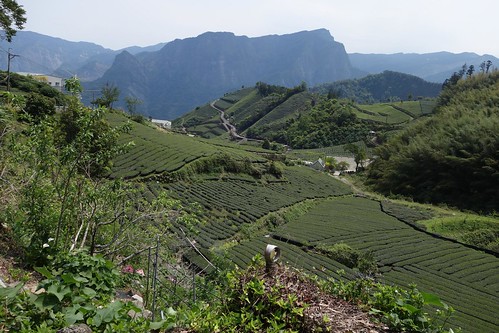UPDATE: Eco-Cha's response to this piece. And Taiwan Law Blog's.
Clarissa Wei (@dearclarissa) is emerging as a strong voice on environmental and social issues in Taiwan. Her latest piece discusses how the government is destroying high mountain oolong tea farms above 2500 meters in an environmentally-oriented move...
High mountain agriculture can be quite destructive; it erodes the landscape and causes harmful pesticides and fertilizers to contaminate water sources and the land. The additives also strip the soil of moisture, rendering it completely useless in a matter of decades. It’s a toxic industry; for every one pound of tea, roughly $9 USD is spent on pesticides and fertilizers. To discourage high mountain farming, in 2014, Taiwan tea researchers engineered a low-altitude tea—known as Taiwan Tea Number 22—that replicates high mountain tea aromas.The demand for high mountain tea of course leads to the perennial problem of imports repackaged as local teas:
In response to the environmental lobbyists and influenced by voter interests, the government set off to reforest high-elevation tea farms and restore them to their pre-agricultural state. Most farmland was seized and reclaimed.
“It’s a very black-and-white matter to the government,” Limei says. “They see high mountain tea trees and they want to cut it down. What about high mountain cabbage farms and hotels? Those are more destructive than tea. We didn’t even use pesticides.”
I think about the slew of tea shops in Taipei City alone. High mountain oolong tea is on every tea menu in town. Annual domestic production of tea in Taiwan adds up to 15,000 tons, while demand is about 45,000 tons. The math doesn’t add up.Yes, that's right. Illegal planting of betel nut and even more urgently, bamboo, all over Taiwan's mountains, but what's really concerning is... tea. Although I have to admit I experienced a strong moment of skepticism at the "we don't even use pesticides" remark.
“A lot of it is imported now from Vietnam, India, and Thailand, and then branded as Taiwan tea,” Tsay says. He says that in a load of commercially marketed Taiwanese oolong tea leaves, only 70 percent of that is real Taiwan oolong. The rest is imported and then mixed in with the batch.
There's a lot going on here. The last few years has seen much government activity in restructuring and renewing mountain lands. I was delighted to find, a couple of years ago, that the government had gone in and demolished the scrum of illegal restaurants and hostels at Tayuling below Wuling. It has taken many years to get this far -- in the early 2000s, for example, when the government handed out subsidies for reforestation, farmers would obtain a plot of land, whack down all its trees, and replant trees to collect subsidies. Strangely, the nation cut its production of grains and let grain producing land lie fallow since it had agreed to import grain from the US... while ignoring slopeland development. Finally, hovering in the background of clarifying who owns what is the increasing assertiveness of aborigines towards lands they once owned and the bitter struggle between the Han government and the aborigines over land (examples: 2001, 2015).
MORE ON THE CLOSURE OF THINKING TAIWAN: The pro-KMT China Times says that Tsai Ing-wen's foundation couldn't decide how Thinking Taiwan should handle criticism of the Tsai Administration. As a very sharp observer of Taiwan sharply observed: they had all that time to think about it, and didn't come up with a policy?
____________________
Daily Links:
- Interview with Shawna Yang Ryan, writer of Green Island
- Eurasia Review:India-Taiwan Relationship: Need To Emerge From The Chinese Shadow – Analysis. I've been saying this in print since the late 1990s, and it is really wonderful to see it finally take place.
- Prague is expelling CCP goons who attacked pro-democracy and pro-Tibet protesters in Czech during Xi's visit.
- Pig farmers protest in front of AIT. This lead by the TSU. Welcome to being the party in power, DPP....
- Because there is just not enough stupid in the world: hilarity ensued this week when a group of businessmen suffering from low-altitude oxygen deprivation erected a statue of Chinese premier Wen Jia-bao as a "Taiwan hero"... the statue was replaced overnight by a tree.
[Taiwan] Don't miss the comments below! And check out my blog and its sidebars for events, links to previous posts and picture posts, and scores of links to other Taiwan blogs and forums!

Interesting article, had mixed feelings about it, the farm in question sounded legit.. but i was mostly just pleased to see any sort of effort to take care of the countryside/nature by the Taiwanese government.
ReplyDelete